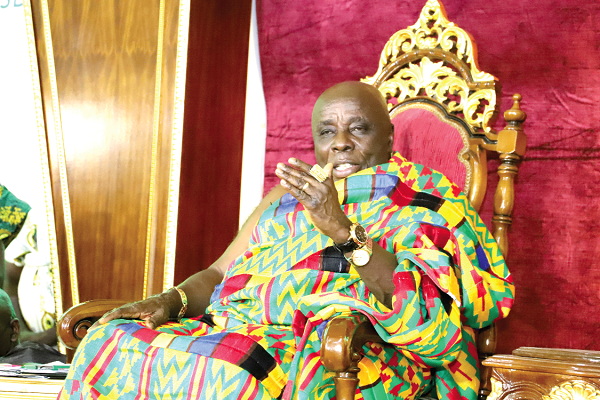The Okyenhene, Osagyefuo Amoatia Ofori Panin, has said until world leaders strive to curb poverty among indigenous communities, the effort to achieve the sustainable development goals (SDGs) and also combat climate change will remain a daunting challenge.
He said reducing poverty required empowering the people to earn decent livelihoods to encourage them to support both local and global interventions.
The Okyenhene, who was addressing participants at a royal dialogue on climate change and the SDGs at the Ofori Panin Fie in Kyebi in the Eastern Region yesterday, added that “sustainable development can only work when the people who live in indigenous areas own the process and the results”.
“The reason the implementation of the SDGs and the fight against climate change have not worked over the years, even though they have made impressive strides in curbing extreme poverty, is that they are somewhere. They have to be local and the people who are going to benefit have to participate,” he said.
Dialogue
The two-day event is being organised as a precursor to the 26th UN Conference of Parties on Climate Change (COP 26).
Among participants are government officials, business leaders, development partners, civil society organisations and traditional rulers.
The dialogue is aimed at championing urgent climate actions under the Paris Agreement and the accelerated implementation of the SDGs.
It will also help make the voices of traditional leaders bear on the national and international discourse on climate action and the attainment of the SDGs.
It is being organised by the SDGs Advisory Unit, Office of the President and the Okyeman Environment Foundation.
Poverty situation
The Okyenhene said when poverty and climate change joined forces, it had dire implications on the health and socio-economic well-being of the people.
He said while there was poverty in New York City, London, Johannesburg and Paris, the poor in those cities enjoyed what he described as “poverty within the opportunity”.
“But incidental poverty has found its headquarters on our continent. What we have on our continent is poverty without option.
“So maybe climate change is important, but we need to beat the war on poverty and we need our developed nations and partners to help us,” he said.
According to him, much of the poverty in Africa was as a result of corruption and exploitation, which he said deprived people access to their own natural resources, quality health care and education.
![]()
President’s message
In a pre-recorded goodwill message, President Nana Addo Dankwa Akufo-Addo said Ghana would introduce major policy interventions to encourage private sector support in the fight against climate change.
To that end, he said, the government had established an advisory group of prominent private chief executives who had set up a $100-million SDGs delivery fund and a $200-million green fund to complement the government’s effort at tackling climate change and fund in the attainment of the SDGs.
The Minister of Environment, Science, Technology and Innovation, Dr Kwaku Afriyie, said while striving to attain the SDGs, Ghana would not renege on its values and ethics.
The British High Commissioner, Ms Harriet Thompson, said developing nations such as Ghana had little to do with the causes of climate change, yet faced the consequences of climate impact.

